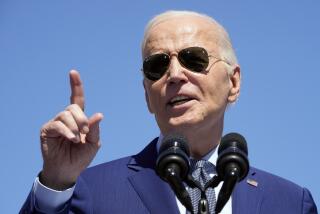War is hell on approval ratings
No wonder President Obama used only his second Oval Office address to get the Iraq war so publicly off the domestic debate table just nine weeks before his first midterm elections.
He even flew Vice President Joe Biden over for another quick tour of duty in Baghdad to underline for the public (media) the occasion of the end of U.S. combat operations — officially, at least, since 50,000 U.S. troops remain there.
Wizard Gary Langer, the chief numbers-crunching consultant over at ABC News, has been tracking the effect of unpopular wars on presidential approvals. Not surprising, not good.
Harry Truman (Korea) lost 25 points during his conflict. Lyndon Johnson (Vietnam) dropped 32. And George W. Bush (Iraq) plummeted 43. Even without formal wars, foreign incidents can pummel pols back home; just ask helpless President Carter about the Iranian hostage crisis that helpfully elected Ronald Reagan in 1980.
Four years into peacetime, albeit during the Cold War, Truman had 54% approval in 1949. That fell to the high 20s by 1952, forcing Truman to abandon any reelection plans. Same for LBJ, whose approval slipped to 42% from 74%, causing him to give up on renomination in 1968.
Bush’s approvals began up in the 70s, helping him to become only the second president (after FDR) in modern times to increase his party’s membership during initial midterms. Eventually, of course, they fell right down there with Truman’s. The difference was, because of his team’s political skills and John Kerry’s campaign ineptness in 2004, Bush already had a second term in the bank before he hit bottom.
Bush’s war unpopularity did, however, contribute to the Democrats’ recapturing both houses of Congress in 2006 after a 12-year GOP siege. Continuing Bush disenchantment, a lethargic John McCain campaign and Wall Street terror mixed with Obama’s millions and magic mouth to grow the Democratic majority even larger in 2008, and also secure the White House.
So, this time it’s Obama’s turn. Now that he’s made the Afghan conflict his own with two surges and three commanders, is he a Carter or a Bush? Obama’s approvals began high like Bush’s but have now cratered dangerously close to Lyndon Johnson’s when he abandoned a reelection bid. Johnson’s low, of course, came in the tumultuous election year of 1968 with virulent antiwar fervor.
Although some polls show Americans have already decided against a second Obama term in 2012, there remains much time for recovery, although the economy shows signs of even further weakening and war losses are growing.
Langer sets June 2004 as the first time a polling majority (52%) decided the Iraq war was not worth it. And numbers went downhill from there, not coincidentally, as casualty figures rose. The Afghan war, which was tied so closely to Sept. 11 and its planning, has gone on more in the background.
However, recent polls show dissatisfaction mounting. Casualties are mounting; iCasualties.org lists 1,269 U.S. deaths since 2001, about 25% (322) of them this year. Obama finds himself in the uncomfortable position of having built his political career substantially on being against one war (Iraq) while being in favor of and aggressively prosecuting another (Afghanistan).
Another mental morsel for political pondering: What if, come that time next summer, as Republican candidates vie for position, Afghan casualties are high, the withdrawal is delayed, jobs and the economy have yet to rebound and Obama’s public approval is around or below those that caused Johnson to give up his reelection dream?
andrew.malcolm@latimes.com
Top of the Ticket, The Times’ blog on national politics (www.latimes.com/tickethttp://161.35.110.226/ticket), is a blend of commentary, analysis and news. These are selections from the last week.
More to Read
Get the L.A. Times Politics newsletter
Deeply reported insights into legislation, politics and policy from Sacramento, Washington and beyond. In your inbox three times per week.
You may occasionally receive promotional content from the Los Angeles Times.









